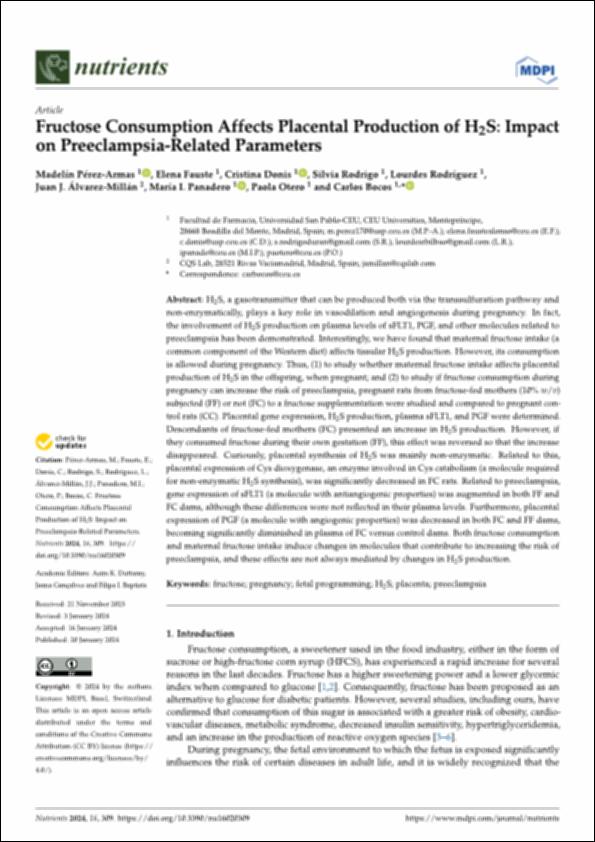Please use this identifier to cite or link to this item:
http://hdl.handle.net/10637/15521Fructose Consumption Affects Placental Production of H2S: Impact on Preeclampsia-Related Parameters

See/Open:
Fructose_Perez_et_al_Nutrients_2024.pdf
1,01 MB
Adobe PDF
See/Open:
Dataset Nutrients 2024 M.Perez.xlsx
20,2 kB
Microsoft Excel XML
See/Open:
Readme Dataset - Nutrients-2024-m.perez_EN.txt
962 B
Text
See/Open:
Readme Datos de Investigación-Nutrients-2024-m.perez_ES.txt
1017 B
Text
| Title: | Fructose Consumption Affects Placental Production of H2S: Impact on Preeclampsia-Related Parameters |
| Authors : | Pérez Armas, Madelín Fauste Alonso, Elena Donis Rodríguez, Cristina Rodrigo, Silvia Rodríguez, Lourdes Álvarez Millán, Juan José Panadero Antón, María Isabel Otero Gómez, Paola Bocos de Prada, Carlos |
| Keywords: | Fructose; Pregnancy; Fetal programming; H2S; Placenta; Preeclampsia |
| Publisher: | MDPI |
| Citation: | Pérez-Armas, M.; Fauste, E.; Donis, C.; Rodrigo, S.; Rodríguez, L.; Álvarez-Millán, J.J.; Panadero, M.I.; Otero, P.; Bocos, C. Fructose Consumption Affects Placental Production of H2S: Impact on Preeclampsia-Related Parameters. Nutrients 2024, 16, 309. https://doi.org/10.3390/nu16020309 Pérez-Armas, M.; Fauste, E.; Donis, C.; Rodrigo, S.; Rodríguez, L.; Álvarez-Millán, J.J.; Panadero, M.I.; Otero, P.; Bocos, C. Fructose Consumption Affects Placental Production of H2S: Impact on Preeclampsia-Related Parameters. [Dataset]. Depósito digital en CEU ReI, http://hdl.handle.net/10637/15521 |
| Abstract: | H2S, a gasotransmitter that can be produced both via the transsulfuration pathway and non-enzymatically, plays a key role in vasodilation and angiogenesis during pregnancy. In fact, the involvement of H2S production on plasma levels of sFLT1, PGF, and other molecules related to preeclampsia has been demonstrated. Interestingly, we have found that maternal fructose intake (a common component of the Western diet) affects tissular H2S production. However, its consumption is allowed during pregnancy. Thus, (1) to study whether maternal fructose intake affects placental production of H2S in the offspring, when pregnant; and (2) to study if fructose consumption during pregnancy can increase the risk of preeclampsia, pregnant rats from fructose-fed mothers (10% w/v) subjected (FF) or not (FC) to a fructose supplementation were studied and compared to pregnant control rats (CC). Placental gene expression, H2S production, plasma sFLT1, and PGF were determined. Descendants of fructose-fed mothers (FC) presented an increase in H2S production. However, if they consumed fructose during their own gestation (FF), this effect was reversed so that the increase disappeared. Curiously, placental synthesis of H2S was mainly non-enzymatic. Related to this, placental expression of Cys dioxygenase, an enzyme involved in Cys catabolism (a molecule required for non-enzymatic H2S synthesis), was significantly decreased in FC rats. Related to preeclampsia, gene expression of sFLT1 (a molecule with antiangiogenic properties) was augmented in both FF and FC dams, although these differences were not reflected in their plasma levels. Furthermore, placental expression of PGF (a molecule with angiogenic properties) was decreased in both FC and FF dams, becoming significantly diminished in plasma of FC versus control dams. Both fructose consumption and maternal fructose intake induce changes in molecules that contribute to increasing the risk of preeclampsia, and these effects are not always mediated by changes in H2S production. |
| Description: | Se adjuntan datos de investigación y fichero Readme.txt |
| URI: | http://hdl.handle.net/10637/15521 |
| Rights : | http://creativecommons.org/licenses/by-nc-nd/4.0/deed.es Open Access |
| ISSN: | 2072-6643 |
| Issue Date: | 20-Jan-2024 |
| Center : | Universidad San Pablo-CEU |
| Appears in Collections: | Facultad de Farmacia |
Items in DSpace are protected by copyright, with all rights reserved, unless otherwise indicated.

